St. Francis of Assisi Weekly Reflections
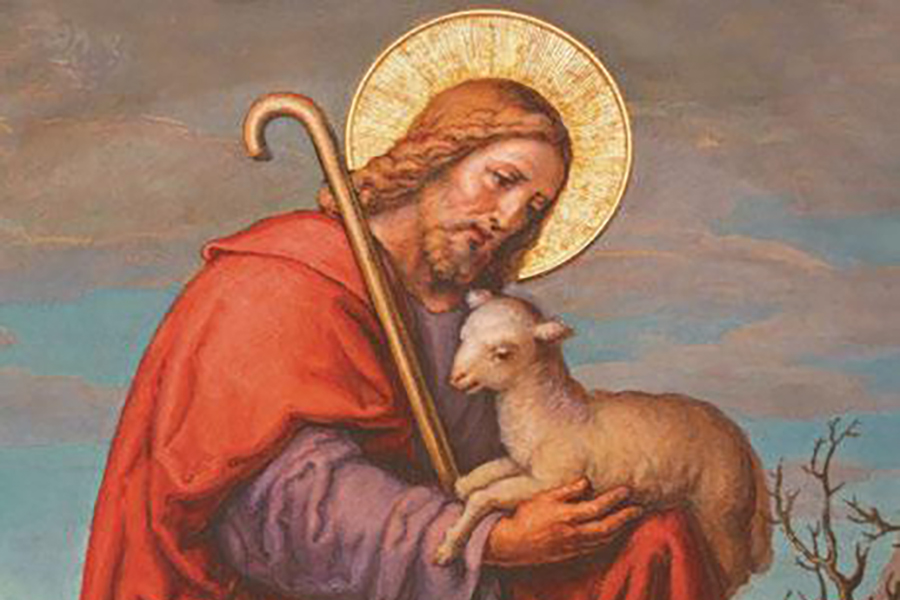
I Am the Good Shepherd
04-21-2024Weekly ReflectionWe Celebrate Worship Resource, Vol. 49, No. 1“I am the good shepherd,” Jesus tells his disciples, “[who] lays down his life for the sheep” (John 10:11). Much later, after Jesus’ death and resurrection, his disciples realized that he meant that literally. Jesus loves us and cares for us so much that he sacrificed his life for us, giving his life to save us. He calls us now to care for those we love, to put their needs and desires before our own. In this way, we imitate him, our Good Shepherd. Moreover, he tells his disciples that he is also the good shepherd for the “other sheep that do not belong” (10:16), Indeed, he gives his life on the cross so that all may be saved. In today’s first reading, Peter invokes this saving power after healing a handicapped person, who could be called one of the “other sheep that do not belong.” Peter invokes this saving power over illness, injury, and even death. Similarly, we are challenged to care not only for those we love, but also for the other sheep that do not belong, for were are, through God’s love, all children of God.
How can you imitate the Good shepherd in caring not only for the members of your own flock but also for others who “do not belong”?
Yo Soy El Buen Pastor
“Yo soy el buen pastor”, dice Jesús a sus discípulos, “[que] da su vida por sus ovejas” (Juan 10:11). Mucho más tarde, después de la muerte y resurrección de Jesús, sus discípulos se dieron cuenta de que lo decía era literalmente. Jesús nos ama y se preocupa tanto por nosotros que sacrificó su vida por nosotros, para salvarnos. Él nos llama ahora para cuidar a los que amamos, para poner sus necesidades y deseos antes que los nuestros. De esta manera, lo imitamos, nuestro buen pastor. Además, le dice a sus discípulos que él también es el buen pastor para las "otras ovejas que no son de este redil" (10:16), de hecho, da su vida en la cruz para que todas puedan salvarse. En la primera lectura de hoy, Pedro invoca este poder salvador después de curar a una persona discapacitada, que podría llamarse una de las “otras ovejas que no pertenecen”. Pedro invoca este poder de salvación sobre la enfermedad, las lesiones e incluso la muerte. Del mismo modo, tenemos el desafío de preocuparnos no solo por aquellos que amamos, sino también por las otras ovejas que no pertenecen, porque son, a través del amor de Dios, todos los hijos de Dios.
¿Cómo puedes imitar al buen pastor al cuidar no solo a los miembros de tu propio rebaño sino también a otros que “no pertenecen”?
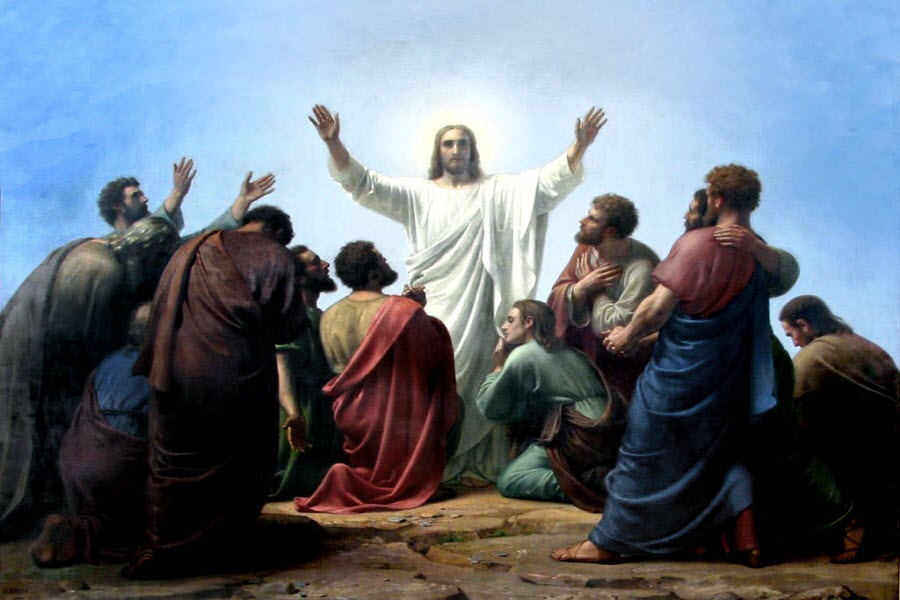
Peace
04-14-2024Weekly ReflectionWe Celebrate Worship Resource, Vol. 49, No. 1After Peter rebukes his audience for their responsibility in putting Jesus to death, he offers them an opportunity to make amends: “Repent, therefore, and be converted, that your sins may be wiped away” (Acts 3:19). He ought to know. While the crowds were calling for Jesus’ death, Peter had denied him three times and stayed as far away from him as he could. So too had most of the other disciples. Secretly gathering later in the upper room, having heard that Jesus had risen from the dead, they must have wondered if he would be angry or disappointed in them for abandoning him. But he was not. “Peace be with your,” he said immediately (Luke 24:36), before calling upon them to preach repentance for the forgiveness of sins, which Peter did, boldly and eloquently. Now Peter is preaching to us. We have sinned. We have failed. Yet always Jesus greets us with forgiveness, as he does here today in the breaking of bread. Peace, he offers, the peace of knowing that always, anytime, our sins can be wiped away.
Do you feel that sense of peace that comes from the Lord? How can you pass that on to your neighbor?
La Paz
Después de que Pedro reprende a su audiencia por su responsabilidad al dar muerte a Jesús, les ofrece la oportunidad de enmendarlo: “Arrepiéntanse y conviértanse para que se les perdonen sus pecados” (Hechos 3:19). Él debería saberlo. Mientras la multitud pedía la muerte de Jesús, Pedro lo negó tres veces y se mantuvo lo más lejos que pudo de él. También lo habían hecho la mayoría de los otros discípulos. Reunidos en secreto más tarde en el aposento alto, después de haber escuchado que Jesús había resucitado de entre los muertos, debieron haberse preguntado si él estaría enojado o decepcionado con ellos por haberlo abandonado. Pero no lo fue. “La paz esté con ustedes”, dijo inmediatamente (Lucas 24:36), antes de llamarlos a predicar el arrepentimiento para el perdón de los pecados, lo que Pedro hizo con valentía y elocuencia. Ahora Pedro nos está predicando. Hemos pecado. Hemos fracasado. Sin embargo, Jesús siempre nos saluda con el perdón, como lo hace hoy aquí al partir el pan. Paz, ofrece, la paz de saber que siempre, en cualquier momento, nuestros pecados pueden ser borrados.
¿Sientes esa sensación de paz que viene del Señor? ¿Cómo puedes transmitirle eso a tu vecino?
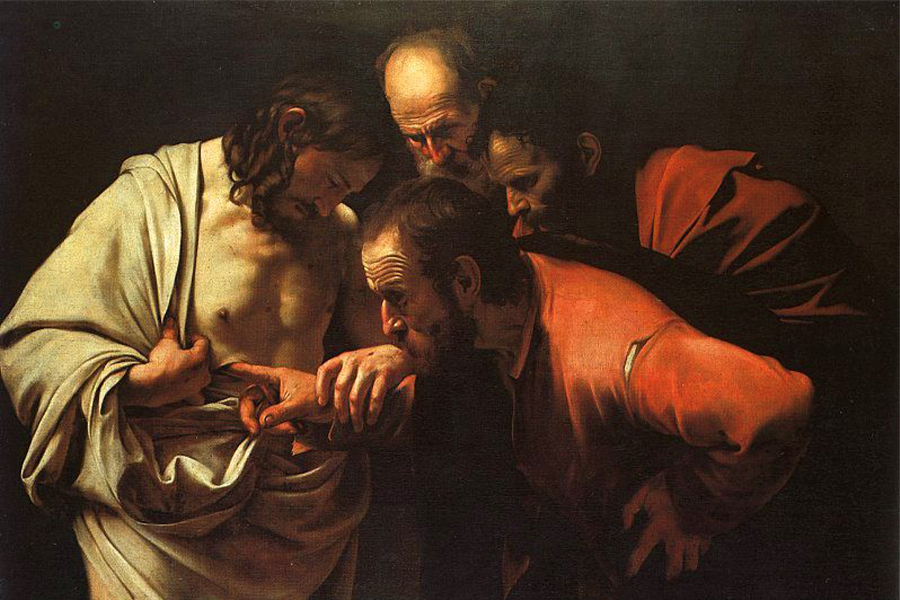
Doubting is Natural
04-07-2024Weekly ReflectionWe Celebrate Worship Resource, Vol. 49, No. 1Thomas is a saint for us all. We all have doubts. Perhaps they’re the nagging little doubts we all have from time to time about our faith. Perhaps they’re big enough to make us turn away. Despite having heard eyewitness testimony from ten of his closest friends, Thomas doubted. He doubted so strongly that he insisted he would not believe unless he saw for himself, leading Jesus to later declare, “Blessed are those who have not seen and have believed” (John 20:29). In one sense, we are those believers Jesus blesses. But in another sense, we can see him, for in baptism we were blessed with eyes of faith. With those eyes, we can see the Lord alive in the world, in the least of our bothers and sisters, in the goodness of those who act with mercy and love, in the Eucharist that we receive today. Doubt is natural, is normal, and is not erased by faith. Most of us who believe still have our doubts. We believe despite our doubts. We look to Thomas, who doubted for us all, and to Jesus, who in his tender mercy returned to the upper room to reassure Thomas that indeed, he had been raised.
How are you reassured of Jesus’ presence? When do you still have doubts?
La Duda Es Natural
Tomás es un santo para todos nosotros. Todos tenemos dudas. Quizás sean las pequeñas dudas persistentes que todos tenemos de vez en cuando sobre nuestra fe. Quizás sean lo suficientemente grandes como para hacernos dar la vuelta. A pesar de haber escuchado el testimonio de diez de sus amigos más cercanos, Thomas dudaba. Dudaba tanto que insistió en que no creería a menos que lo viera por sí mismo, lo que llevó a Jesús a declarar más tarde: “Bienaventurados los que no vieron y creyeron” (Juan 20:29). En cierto sentido, somos esos creyentes a los que Jesús bendice. Pero en otro sentido podemos verlo, porque en el bautismo fuimos bendecidos con los ojos de la fe. Con esos ojos podemos ver al Señor vivo en el mundo, en el más pequeño de nuestros hermanos y hermanas, en la bondad de quienes actúan con misericordia y amor, en la Eucaristía que hoy recibimos. La duda es natural, es normal y no se borra con la fe. La mayoría de los que creemos todavía tenemos nuestras dudas. Creemos a pesar de nuestras dudas. Miramos a Tomás, que dudó por todos nosotros, y a Jesús, que en su tierna misericordia regresó al aposento alto para asegurarle a Tomás que efectivamente había resucitado.
¿Cómo te sientes seguro de la presencia de Jesús? ¿Cuándo todavía tienes dudas?
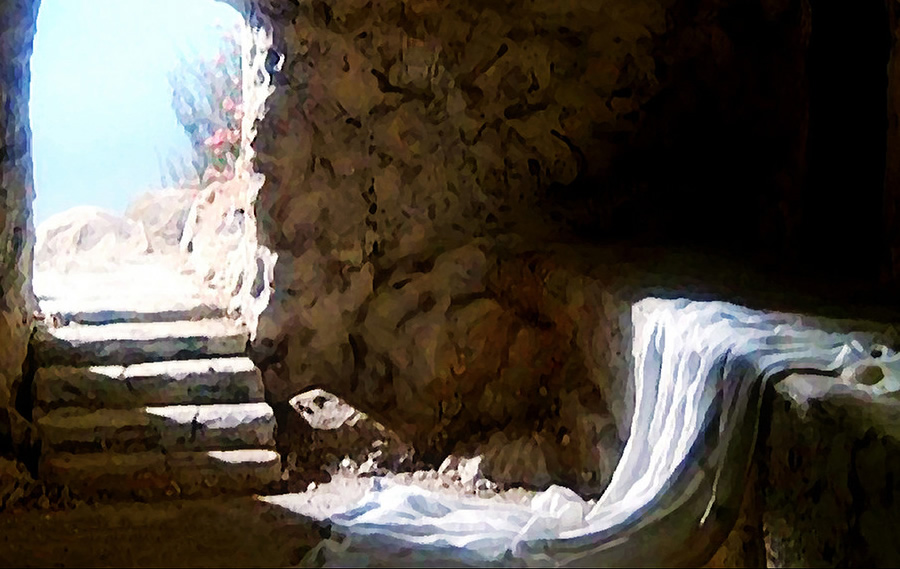
The Empty Tomb
03-31-2024Weekly ReflectionWe Celebrate Worship Resource, Vol. 49, No. 1Today we celebrate Jesus’ ultimate victory over sin and death. We encounter the empty tomb in today’s Gospel, this glorious sign of the power God has over the grave. But the Gospel reminds us that this was not so apparent to his disciples on that first Easter morning. Mary Magdalene assumed someone had taken his body. Peter and the other disciple were confused; they couldn’t understand. Undoubtedly, they were devastated by Jesus’ death and still couldn’t think clearly. His crucifixion, they could see. That they could understand...or so they thought. Today’s first reading shows how much Peter’s understanding grew. After the risen Lord appeared to him and the other disciples, after they received the Holy Spirit, after Jesus commissioned them to preach and baptize and make disciples, Peter could stand in front of a group of Gentiles and confidently testify to Jesus’ resurrection and all that had happened before and after. Now, as baptized Christians, this is our commission. Through words and action, through the charity we do and the prayers we offer, through our works of mercy and love, we bear witness to the Easter message: He has been raised. He is with us always.
How can you give witness to our Easter joy, today and always?
La Tumba Vacía
Hoy celebramos la victoria definitiva de Jesús sobre el pecado y la muerte. Encontramos la tumba vacía en el Evangelio de hoy, este signo glorioso del poder que Dios tiene sobre la tumba. Pero el Evangelio nos recuerda que esto no fue tan evidente para sus discípulos aquella primera mañana de Pascua. María Magdalena supuso que alguien se había llevado su cuerpo. Pedro y el otro discípulo estaban confundidos; no podían entender. Sin duda, estaban devastados por la muerte de Jesús y todavía no podían pensar con claridad. Pudieron ver su crucifixión. Que podían entender...o eso pensaban. La primera lectura de hoy muestra cuánto creció la comprensión de Pedro. Después de que el Señor resucitado se apareció a él y a los otros discípulos, después de que recibieron el Espíritu Santo, después de que Jesús les comisionó a predicar, bautizar y hacer discípulos, Pedro pudo pararse frente a un grupo de gentiles y testificar con confianza de la resurrección de Jesús y de todo lo que había sucedido antes y después. Ahora, como cristianos bautizados, esta es nuestra comisión. A través de las palabras y las acciones, de la caridad que hacemos y de las oraciones que ofrecemos, de nuestras obras de misericordia y de amor, damos testimonio del mensaje pascual: Ha resucitado. Él está con nosotros siempre.
¿Cómo puedes dar testimonio de nuestra alegría pascual, hoy y siempre?
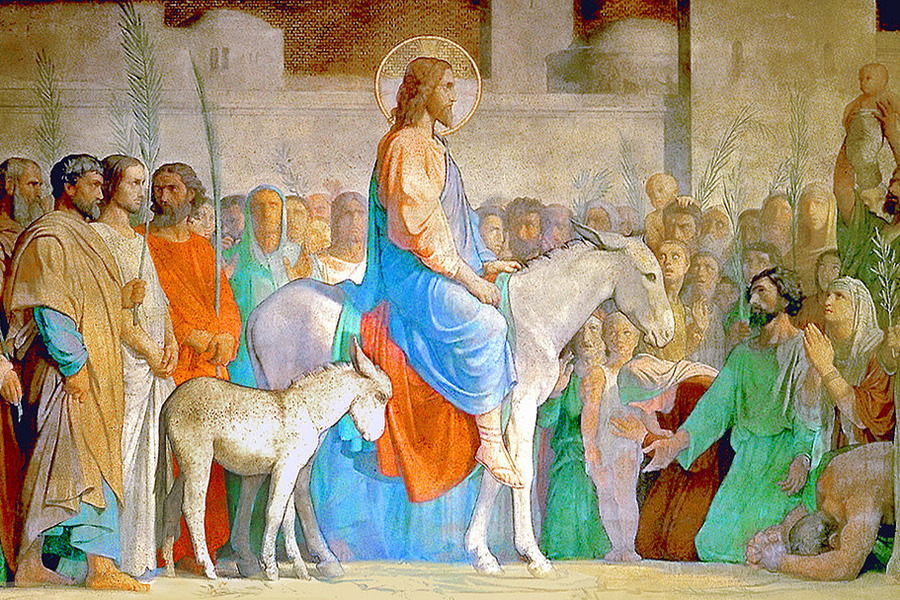
What Can I Do For You Today?
03-24-2024Weekly ReflectionTom SchmidtThis year, we hear the Passion from the gospel of Mark. One thing unique about this reading is the emphasis on Jesus being abandoned by his disciples. First, the leaders of the disciples cannot even support Jesus in his agony in the garden: They fall asleep, three times. Then there is Judas, who seeks out the chief priests to make a deal with them, Peter, who denies Jesus three times, and the crowds who cried, “Hosanna!” a few days before, now call for him to be crucified. What does this tell us? With friends like these, who needs enemies? No, the point is that Jesus died specifically for these people, not because they were once friends, but because they were sinners, who needed Jesus. When we find ourselves in sin, when we think that everything we do is wrong, or when we think we can’t possibly deserve to be loved by God—that is when God can help us, if we just stop hating ourselves and start loving and trusting the Lord. It is not the time to pretend we have avoided the big sins, or to brag about some of the good we may have done. Instead simply agree that you need his help. God loves sinners who know they need his forgiveness and don’t deserve it. But maybe you have already been forgiven and wonder what’s next. Remember the ones you would not expect to support Jesus: the centurion proclaiming him Son of God, Joseph giving him a burial place, the women who followed Jesus. These were people who did not claim to be worthy, just did what they could to show their love. Ask Jesus each morning when you wake up, “What can I do for you today?” and do what you can.
¿Que Puedo Hacer Por Ti Hoy?
Este año escuchamos la Pasión del evangelio de Marcos. Algo único de esta lectura es el énfasis en el abandono de Jesús por sus discípulos. Primero, los líderes de los discípulos ni siquiera pueden apoyar a Jesús en su agonía en el huerto: Se quedan dormidos tres veces. Luego, Judas busca a los sumos sacerdotes para hacer un trato con ellos, Pedro niega a Jesús tres veces, y las multitudes que gritaban "¡Hosanna!" unos días antes, ahora piden que lo crucifiquen. ¿Qué nos dice esto? Que con amigos como éstos, ¿quién necesita enemigos? No, el punto es que Jesús murió específicamente por estas personas, no porque alguna vez fueran amigos, sino porque eran pecadores y necesitaban a Jesús. Cuando nos encontramos en pecado, cuando pensamos que todo lo que hacemos está mal, o cuando pensamos que no podemos merecer ser amados por Dios, ahí es cuando Dios puede ayudarnos, si simplemente dejamos de odiarnos a nosotros mismos y comenzamos a amar y confiar en el Señor. No es el momento de fingir que hemos evitado los grandes pecados ni de presumir de algo bueno que hayamos hecho. En lugar de eso, simplemente acepta que necesitas su ayuda. Dios ama a los pecadores que saben que necesitan su perdón y no lo merecen. Pero tal vez ya hayas sido perdonado y te preguntes qué sigue. Acuérdate de los menos esperados de apoyar a Jesús: el centurión que lo proclamó Hijo de Dios, José dándole un lugar de sepultura, las mujeres que siguieron a Jesús. Eran personas que no decían ser dignas, simplemente hacían lo que podían para mostrar su amor. Pregúntale a Jesús cada mañana al despertar: "¿Qué puedo hacer por ti hoy?" y haz lo que puedas.

From Death to New Life
03-17-2024Weekly ReflectionWe Celebrate Worship Resource, Vol. 49, No. 1Lent is a season of change. After all, we have been called to repent since the beginning of Lent and change is the goal of repentance. When we truly repent, we change our behavior and return to God with a clean heart. But it’s not easy. Giving something up means dying to something we’ve grown used to and comfortable with. But to preserve our souls for eternal life we must sacrifice our own will, we must die to those aspects of our nature that separate us from God—selfishness, pride, indifference, unkindness, hate—all those things that separate us not only from God but from all God’s children. We are all mortal beings. One day we too will fall to the ground and die—as a grain of wheat does in order to produce much fruit; as two thousand years ago Jesus did to draw everyone to his glorified self. While we live, may we imitate that selfsacrificing love of the Lord and embrace the selflessness, the humility, the hopefulness, the kindness, and the love we are called to put into action.
What aspect of your life needs to die in order for you to produce great fruit?
De La Muerte A La Nueva Vida
La Cuaresma es una temporada de cambios. Después de todo, hemos sido llamados a arrepentirnos desde el comienzo de la Cuaresma y el cambio es el objetivo del arrepentimiento. Cuando nos arrepentimos verdaderamente, cambiamos nuestro comportamiento y volvemos a Dios con un corazón limpio. Pero no es fácil. Renunciar a algo significa morir por algo a lo que nos hemos acostumbrado y con lo que nos sentimos cómodos. Pero para preservar nuestras almas para la vida eterna debemos sacrificar nuestra propia voluntad, debemos morir a aquellos aspectos de nuestra naturaleza que nos separan de Dios: el egoísmo, el orgullo, la indiferencia, la crueldad, el odio; todas esas cosas que nos separan no solo de Dios. sino de todos los hijos de Dios. Todos somos seres mortales. Un día nosotros también caeremos al suelo y moriremos, como lo hace el grano de trigo para dar mucho fruto; como hizo Jesús hace dos mil años para atraer a todos a su yo glorificado. Mientras vivamos, que imitemos ese amor abnegado del Señor y abracemos el altruismo, la humildad, la esperanza, la bondad y el amor que estamos llamados a poner en acción.
¿Qué aspecto de tu vida necesita morir para que puedas producir grandes frutos?

The Light of the World
03-10-2024Weekly ReflectionWe Celebrate Worship Resource, Vol. 49, No. 1The first reading is a bridge from last Sunday’s Gospel to today’s. Recall that last week we heard Jesus drive out those who had polluted the temple by turning it into a marketplace, then defend himself by testifying that after they destroyed the temple he would raise it up in three days. Today we hear that the Chosen People had polluted the temple by their infidelity, leading to its destruction at the hands of the Babylonian army. But after defeating them, Cyrus called upon the Jewish people to return to Jerusalem and rebuild it. And so they did. This brings us to Nicodemus, a Pharisee whose cautious curiosity leads him to approach Jesus at night to ask him questions, ironically to seek the light. He cannot understand Jesus’ reference to his body as the temple. Jesus explains that when he is raised up it will inspire faith as Moses inspired his people. Whether at the temple during the day or late at night in secret, Jesus invites us again and again to come to the light, to share in the light of Christ so that the truth can be clearly seen. On this Laetare Sunday, let us rejoice in Jesus’ constant desire to offer us himself as the light of the world, leading us to truth, to salvation.
In the light of faith, how do you see Christ in you and in others?
La Luz Del Mundo
La primera lectura es un puente entre el Evangelio del domingo pasado y el de hoy. Recuerde que la semana pasada escuchamos a Jesús expulsar a los que habían contaminado el templo convirtiéndolo en un mercado, y luego se defendió testificando que después de que destruyeran el templo, él lo levantaría en tres días. Hoy escuchamos que el Pueblo Elegido había contaminado el templo con su infidelidad, lo que llevó a su destrucción a manos del ejército babilonio. Pero después de derrotarlos, Ciro llamó al pueblo judío a regresar a Jerusalén y reconstruirlo. Y así lo hicieron. Esto nos lleva a Nicodemo, un fariseo cuya cautelosa curiosidad lo lleva a acercarse a Jesús por la noche para hacerle preguntas, irónicamente para buscar la luz. No puede entender la referencia de Jesús a su cuerpo como templo. Jesús explica que cuando resucite inspirará fe como Moisés inspiró a su pueblo. Ya sea en el templo durante el día o en secreto a altas horas de la noche, Jesús nos invita una y otra vez a venir a la luz, a compartir la luz de Cristo para que la verdad pueda verse claramente. En este Domingo de Laetare, alegrémonos del deseo constante de Jesús de ofrecerse a sí mismo como luz del mundo, conduciéndonos a la verdad y a la salvación.
A la luz de la fe, ¿cómo ves a Cristo en ti y en los demás?

Christ In Us
03-03-2024Weekly ReflectionWe Celebrate Worship Resource, Vol. 49, No. 1Why did Jesus get so angry at the merchants and money changers in the temple area? Why did he cause such a big scene by driving them out? He understandably felt offended by the lack of reverence just outside his Father’s house, but why the uncharacteristic reaction? Perhaps a clue can be found in the answer he gave at the time: “Destroy this temple and in three days I will raise it up” (John 2:19), in which he referred to the temple that was his body. The temple in Jerusalem was regarded as the place God was most present here on earth. But now God was most present on earth in Jesus. Perhaps he saw what they had done to desecrate this temple and foresaw what they would do to his body. The whip he fashioned to drive out the merchants would later be used on him. The faithful needed the merchants and money changers so they could offer sacrifices inside the temple. But Jesus would soon offer the temple of his body as a sacrifice for all. We recognize now that the sacrifice he made led to his glory, that we receive his body when we celebrate the Eucharist, and that Christ is now in us all. May we revere the temples that we all are.
Realizing that Jesus is in you and in your neighbor, how will you make yourself a holy temple and see the holy temple in others?
Cristo En Nosotros
¿Por qué Jesús se enojó tanto con los mercaderes y cambistas en el área del templo? ¿Por qué provocó un escándalo tan grande al expulsarlos? Es comprensible que se sintiera ofendido por la falta de reverencia afuera de la casa de su Padre, pero ¿por qué esa reacción inusual? Quizás una pista se pueda encontrar en la respuesta que dio en su momento: “Destruyan este templo y en tres días lo reconstruiré” (Juan 2:19), en la que se refirió al templo que era su cuerpo. El templo de Jerusalén era considerado el lugar donde Dios estaba más presente aquí en la tierra. Pero ahora Dios estaba más presente en la tierra en Jesús. Quizás vio lo que habían hecho para profanar este templo y previó lo que le harían a su cuerpo. El látigo que creó para expulsar a los comerciantes se utilizaría más tarde contra él. Los fieles necesitaban de los comerciantes y cambistas para poder ofrecer sacrificios dentro del templo. Pero Jesús pronto ofrecería el templo de su cuerpo como sacrificio por todos. Ahora reconocemos que el sacrificio que hizo condujo a su gloria, que recibimos su cuerpo cuando celebramos la Eucaristía y que Cristo ahora está en todos nosotros. Que reverenciemos los templos que todos somos.
Al darte cuenta de que Jesús está en ti y en tu prójimo, ¿cómo harás para convertirte en un templo santo y ver el templo santo en los demás?